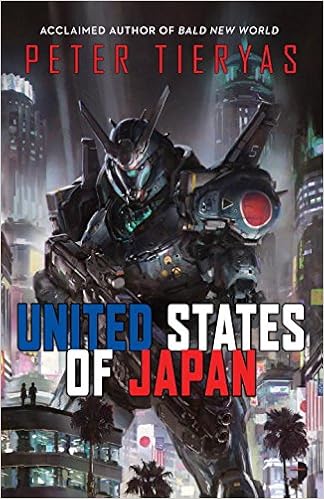written by David Steffen
 World War II is over, decisively ended when the Empire of Japan unleashes their new superweapon on the United States of America. Soon they USA is declared the United States of Japan, under the rule of the Emperor.
World War II is over, decisively ended when the Empire of Japan unleashes their new superweapon on the United States of America. Soon they USA is declared the United States of Japan, under the rule of the Emperor.
The story begins from the point of view of people held in an internment camp for Japanese-American citizens, who are immediately released upon the Japanese seizing control. 40 years later, the child of one of those, Beniko Ishimura, is working as a video game censor as the subversive video game United States of America starts gaining popularity. United States of America is an alternate history war game where the United States won World War II. Meanwhile, Akiko Tsukino of one of the secret police forces, is out to investigate the game herself. They cross paths and begin to uncover deeper secrets about the game and about the United States of Japan.
I like the alt-history aspect of the story, looking at different ways that Japanese government and culture might have grown from 1940s USA insted of the USA we have today. There were some technological elements both fun and dark, as well as exploring the colonial culture aspect where a colony’s culture becomes a mix of its own roots and of the occupying force. The plot as a whole is action-packed, and has lots of exciting events to keep the reader interested, as well as interesting philosophical themes.
What I found less engaging was the way the narrative interacted with Beniko, who is probably what you would call the main protagonist, though we get POV sections from Akiko as well. Big important details about him and what drives him are withheld until later in the story, to add some mystery for the reader I suppose. This is a writing technique that I tend to find distancing rather than engaging because when I’m reading I want to immerse in the POV as deeply as possible, I want to flow along the narrative like riding a river, and when there are all these blank areas where there clearly should be information, it interrupts that flow for me and I have trouble ever immersing. I’m not talking about revealing details about a person’s origin story, exactly, but more things that the person must be thinking about, and yet aren’t in the narrative. I read the whole book, but until the very very end I felt like Ben was a distant stranger, instead of feeling immersed in him, and since he is the main POV character, that was a major obstacle for me. I found myself constantly wondering “Now, why is he doing THAT? What are the actual stakes for him?” and feeling like I never had a satisfactory answer.
I found the character of Akiko much more engaging, despite her having some hair-trigger homicidal tendencies that are only encouraged by her work. Unlike Ben, I felt like I was fully engaged with her character because there was no withholding that served as an obstacle, and she had some real character growth from beginning to end of the book to follow along with.
Overall, I found the book a pretty easy ready, though I would have liked to be able to immerse more deeply in the Beniko character’s point of view.
